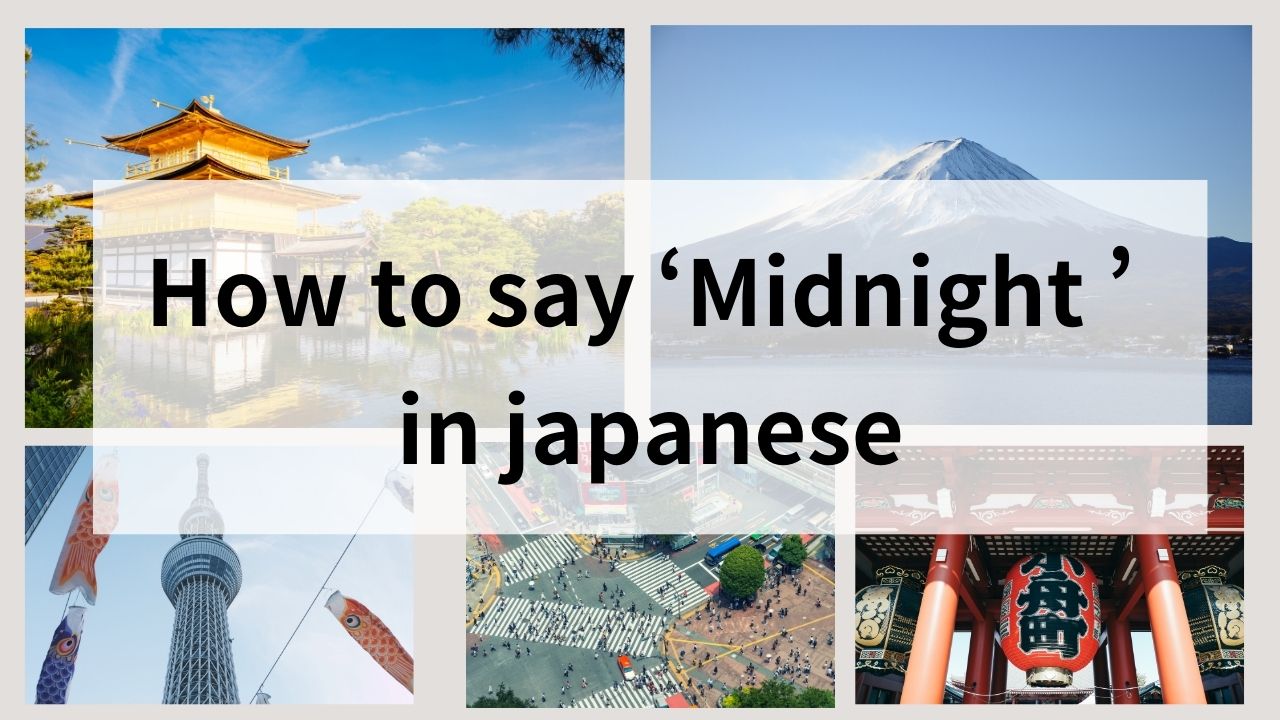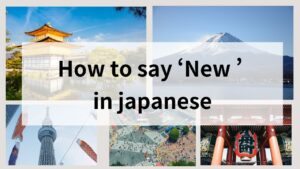Are you curious about how to say “midnight” in Japanese? The term “midnight” signifies a time of deep night, often associated with mystery and tranquility. In this guide, we will explore the Japanese word for “midnight,” its cultural significance, and practical applications.
How Do You Say “Midnight” in Japanese?
The Japanese word for “midnight” is 真夜中 (mayonaka). This term is widely recognized and used in both casual and formal contexts to refer to the time between 12:00 AM and 1:00 AM.
The Japanese Word for Midnight: Mayonaka (真夜中)
“Mayonaka” is a compound word where 真 (ma) means “true” or “genuine,” and 夜中 (yonaka) means “midnight.” This term is used in various phrases and contexts. For example:
- 真夜中に起きる (Mayonaka ni okiru): “Wake up at midnight.”
- 真夜中のミーティング (Mayonaka no mītingu): “Midnight meeting.”
- 真夜中の静けさ (Mayonaka no shizukesa): “The silence of midnight.”
Kanji for Midnight: 真夜中
The kanji for midnight, 真夜中, is often used in literature, traditional contexts, and everyday language. The characters convey a sense of depth and stillness. The reading for this kanji is まよなか (mayonaka), which combines the meanings of “true” and “midnight.”
Examples of phrases containing the term 真夜中 include:
- 真夜中の映画 (Mayonaka no eiga): “Midnight movie.”
- 真夜中の散歩 (Mayonaka no sanpo): “Midnight walk.”
- 真夜中のラジオ (Mayonaka no rajio): “Midnight radio.”
These phrases illustrate how “mayonaka” is used in everyday contexts, emphasizing the concept of nighttime activities or experiences.
Does “Midnight” Work in Japanese?
The English word “midnight” is generally understood in Japan, especially among younger generations or those familiar with Western culture. However, its recognition might be less universal among older individuals or in more traditional contexts. A 5-point scale rates its comprehension as:
- Rating: 4 – Generally understood (60-80% of people)
Rating Details
Understanding the 5-Point Rating for English Words in Japan
The following ratings help explain how English words are typically understood in Japan. The scale is based on context, familiarity, and the target audience.
- 5 - Universally understood (80% or more):
Words that are widely adopted into everyday Japanese, such as "coffee" (コーヒー) or "computer" (コンピューター). These words are part of the standard vocabulary and are recognized by nearly everyone. - 4 - Generally understood (60-80%):
Words that are familiar to most people but might require context for full comprehension. Examples include terms commonly used in specific industries or by younger generations. - 3 - Understood in half of the cases (40-60%):
Words that depend heavily on pronunciation or context. For example, technical terms or less common foreign words that some people may not immediately recognize. - 2 - May not be understood (20-40%):
Words that are unfamiliar to most Japanese speakers unless they have significant exposure to English or specific cultural contexts. These words are often better replaced with their Japanese equivalents. - 1 - Rarely understood (20% or less):
Highly specialized or obscure terms that are unlikely to be recognized by the general public. Clear communication requires the use of Japanese vocabulary or additional explanation.
This rating system provides a practical guide for determining when and how to use English words effectively in Japan. Understanding the audience and context is key to ensuring clear communication.
If clarity is crucial, using the Japanese term 真夜中 (mayonaka) is recommended. While “midnight” may be understood in certain contexts, “mayonaka” ensures effective communication.
The Cultural Significance of Midnight in Japan
Midnight holds a unique place in Japanese culture, often associated with tranquility, mystery, and introspection. It is a time that contrasts with the busy daytime, allowing for reflection and solitude.
Midnight as a Time of Reflection
In Japan, midnight is seen as a moment of peace, where one can escape the hustle and bustle of daily life. It is often a time for introspection, meditation, or quiet activities, such as reading or listening to music.
Midnight in Japanese Folklore and Mythology
Midnight often appears in various Japanese myths and stories, symbolizing the boundary between the mundane and the supernatural. It is believed that spirits and otherworldly beings are more active during this time, adding an element of mystery and intrigue.
In addition to its traditional associations, midnight is often featured in modern Japanese pop culture, particularly in anime and literature, where it serves as a backdrop for dramatic or supernatural events.
- Death Note: The character Light Yagami often conducts his activities at midnight, highlighting the secrecy and tension surrounding his actions.
- Tokyo Ghoul: Midnight is frequently referenced as a time when ghouls come out to hunt, emphasizing the dark themes of the series.
- Noragami: The series explores the supernatural, with midnight often serving as a pivotal moment in the characters’ journeys.
- Spirited Away: Midnight serves as a significant turning point in the film, representing transformation and the crossing of boundaries.
- Bleach: The concept of “midnight” is often tied to the soul reapers’ actions, emphasizing the connection to life and death.
These examples demonstrate how midnight continues to represent mystery, introspection, and the supernatural, bridging traditional folklore and modern storytelling.
Differences Between Midnight in Japan and Overseas
Yes, there can be subtle differences in how “midnight” is perceived in Japan versus Western cultures. In Japan, “mayonaka” (真夜中) often denotes a more serene and contemplative time, while in Western contexts, it may carry connotations of nightlife or parties. Understanding these cultural nuances can help avoid confusion, especially when discussing time-related themes in creative or professional settings.
Practical Applications of “Midnight” in Japanese
Learning how “midnight” is used in Japanese can help you navigate conversations, understand idioms, and recognize its presence in Japanese culture.
Talking About Midnight in Daily Conversation
Here are some examples of how “mayonaka” is used in everyday conversation:
- 真夜中に寝ます (Mayonaka ni nemasu): “I will sleep at midnight.”
- 真夜中の電話 (Mayonaka no denwa): “Midnight call.”
Midnight-Related Idioms or Expressions
While there are relatively few specific idioms involving “mayonaka,” the concept of midnight is often associated with mystery, solitude, and the passage of time. Here are some expressions that incorporate or symbolize midnight:
- 真夜中の鐘 (Mayonaka no kane): “Midnight bell,” often used in literature to signify the turning of time or pivotal moments.
- 真夜中の夢 (Mayonaka no yume): “Midnight dream,” referring to dreams that occur during the late night hours, often seen as significant.
- 真夜中の太陽 (Mayonaka no taiyō): “Midnight sun,” although a more poetic expression, it symbolizes times of unusual brightness or unexpected events.
- 真夜中の思索 (Mayonaka no shisaku): “Midnight contemplation,” emphasizing deep thought or reflection that occurs during the quiet hours.
- 真夜中の習慣 (Mayonaka no shūkan): “Midnight habit,” referring to activities or routines that take place during this time.
These idioms and expressions reflect the deep cultural and aesthetic appreciation of midnight in Japan, often tied to themes of reflection and the passage of time. By learning these phrases, you can gain a deeper understanding of how midnight is interwoven with Japanese language and values.
Midnight in Japanese Cuisine or Products
While midnight itself is not commonly featured in Japanese cuisine, the concept of late-night dining and snacks is quite popular. Here are some notable examples:
- ラーメン (Rāmen): A popular late-night food, often enjoyed by those looking for a comforting meal during the quiet hours.
- おでん (Oden): A traditional Japanese dish often served in winter, enjoyed as a late-night snack at convenience stores.
- 居酒屋 (Izakaya): Many izakayas remain open late into the night, offering a variety of dishes and drinks for those socializing during midnight hours.
These examples highlight how midnight is not only a time of day but also a cultural moment for socializing and enjoying food in Japan.
FAQs
Here are some frequently asked questions about midnight in Japanese culture and language.
Is Midnight a Popular Time in Japan?
Yes, midnight is often seen as a popular time for social activities, late-night dining, and introspection in Japan. It is a time when many people unwind after a long day.
How Do You Write “Midnight” in Japanese?
The word “midnight” can be written in three different scripts in Japanese: hiragana, katakana, and kanji. Each script serves different purposes depending on the context and formality. Here’s a breakdown:
- Hiragana (まよなか, Mayonaka):
Hiragana is the most commonly used script for “midnight” in casual writing or when teaching children. It is simple and easy to read, making it ideal for everyday use. - Katakana (マヨナカ, Mayonaka):
Katakana is rarely used for “midnight,” but it may appear in stylistic contexts, such as advertisements or product names. - Kanji (真夜中, Mayonaka):
Kanji is the most formal and traditional way to write “midnight.” It is often used in literature, official documents, and cultural contexts. The kanji itself conveys a sense of depth and significance.
Choosing which script to use depends on the tone, audience, and purpose of your communication. Understanding these variations can enhance both your written and spoken Japanese skills.
Conclusion
Midnight, or “mayonaka” in Japanese, is more than just a time—it symbolizes tranquility, introspection, and cultural significance. By understanding its role in Japanese language and traditions, you can deepen your appreciation for this unique moment and its place in Japanese society.








